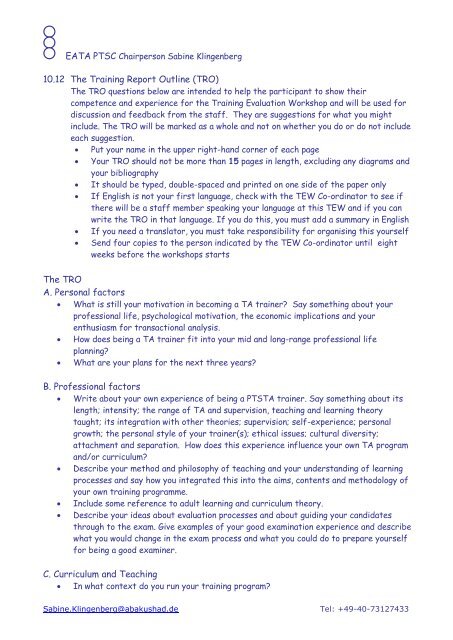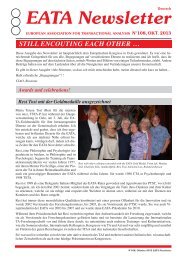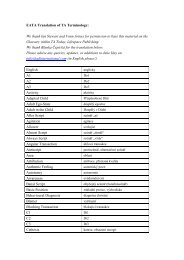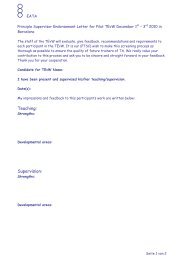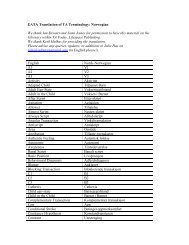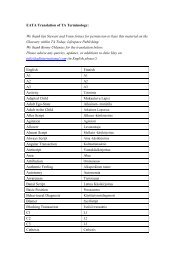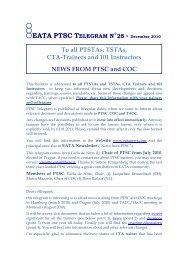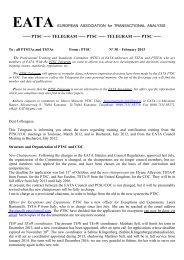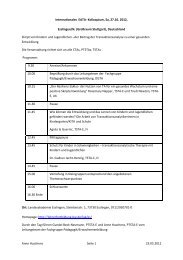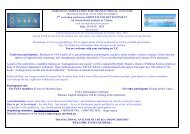PTSC Minutes Les Diablerets
PTSC Minutes Les Diablerets
PTSC Minutes Les Diablerets
You also want an ePaper? Increase the reach of your titles
YUMPU automatically turns print PDFs into web optimized ePapers that Google loves.
EATA <strong>PTSC</strong> Chairperson Sabine Klingenberg<br />
10.12 The Training Report Outline (TRO)<br />
The TRO questions below are intended to help the participant to show their<br />
competence and experience for the Training Evaluation Workshop and will be used for<br />
discussion and feedback from the staff. They are suggestions for what you might<br />
include. The TRO will be marked as a whole and not on whether you do or do not include<br />
each suggestion.<br />
Put your name in the upper right-hand corner of each page<br />
Your TRO should not be more than 15 pages in length, excluding any diagrams and<br />
your bibliography<br />
It should be typed, double-spaced and printed on one side of the paper only<br />
If English is not your first language, check with the TEW Co-ordinator to see if<br />
there will be a staff member speaking your language at this TEW and if you can<br />
write the TRO in that language. If you do this, you must add a summary in English<br />
If you need a translator, you must take responsibility for organising this yourself<br />
Send four copies to the person indicated by the TEW Co-ordinator until eight<br />
weeks before the workshops starts<br />
The TRO<br />
A. Personal factors<br />
What is still your motivation in becoming a TA trainer? Say something about your<br />
professional life, psychological motivation, the economic implications and your<br />
enthusiasm for transactional analysis.<br />
How does being a TA trainer fit into your mid and long-range professional life<br />
planning?<br />
What are your plans for the next three years?<br />
B. Professional factors<br />
Write about your own experience of being a PTSTA trainer. Say something about its<br />
length; intensity; the range of TA and supervision, teaching and learning theory<br />
taught; its integration with other theories; supervision; self-experience; personal<br />
growth; the personal style of your trainer(s); ethical issues; cultural diversity;<br />
attachment and separation. How does this experience influence your own TA program<br />
and/or curriculum?<br />
Describe your method and philosophy of teaching and your understanding of learning<br />
processes and say how you integrated this into the aims, contents and methodology of<br />
your own training programme.<br />
Include some reference to adult learning and curriculum theory.<br />
Describe your ideas about evaluation processes and about guiding your candidates<br />
through to the exam. Give examples of your good examination experience and describe<br />
what you would change in the exam process and what you could do to prepare yourself<br />
for being a good examiner.<br />
C. Curriculum and Teaching<br />
In what context do you run your training program?<br />
Sabine.Klingenberg@abakushad.de Tel: +49-40-73127433
EATA <strong>PTSC</strong> Chairperson Sabine Klingenberg<br />
<br />
<br />
<br />
<br />
<br />
<br />
<br />
<br />
<br />
<br />
<br />
Did you train alone or in co-operation with others? If in co-operation, say with whom<br />
and make clear what your particular contribution you worked on. Who participated in<br />
your training programme?<br />
How did you select participants and what were your selection procedures and what was<br />
your experience?<br />
What was and were still your criteria for taking a trainee into contractual training?<br />
Give an overview of your curriculum and describe seven subjects you think should be<br />
taught at all and describe these subjects according to your field of application.<br />
Report your experience of time structuring while following your curriculum programme,<br />
and report about the experience of the organization of the training days / seminars,<br />
special workshops, therapy marathons, supervision units, etc.<br />
Describe the methods you used with success for teaching TA, including comments on<br />
your general and specific theory and practice. Report how you integrated experiential<br />
learning and encourage personal growth.<br />
Report with few words a special theoretical TA theme you became very interested in?<br />
Report with few words a special theoretical theme of other method you became very<br />
interested in?<br />
Describe the way you of evaluation you used and the evaluation process for different<br />
levels of your trainees?<br />
How do you think it is valuable to prepare candidates for the exam, describe the<br />
process? What are your criteria to decide whether a candidate is ready for<br />
examination process?<br />
How do you know that your methods fit the educational level of your trainees?<br />
D. Supervision<br />
Describe your supervision philosophy and your theoretical understanding of doing<br />
supervision at that time. Give a short example and describe challenges you were faced<br />
with.<br />
E. Therapy<br />
Describe your way to invite candidates for personal development and individual work.<br />
You might include comments on: criteria and requirements for personal growth; the<br />
advantages and disadvantages of multiple personal relationships; possible ethical<br />
problems arising from the above.<br />
F. Ethics<br />
Describe how you use the Ethic Code and ethical guidelines in your training. Outline<br />
your ideas about the relationship between ethics and training practice. Give a short<br />
example.<br />
Describe how you teach about ethics. Give a short example<br />
Describe in short words your experience on ethical issues during exam process as<br />
examiner.<br />
Sabine.Klingenberg@abakushad.de Tel: +49-40-73127433
EATA <strong>PTSC</strong> Chairperson Sabine Klingenberg<br />
G. Organization<br />
Report from your workshops which you have held on conferences national and<br />
international<br />
Report of your engagement within TA Organizations, being a delegate, a member on a<br />
staff, a member on a board, a member on a project group, being an examiner, etc.<br />
H. Research<br />
Outline your ideas about the relationship between research and TA theory and<br />
practice. What TA research has had the most significance for you, and how did you<br />
integrate research into your training programme?<br />
I. Fields of TA Practice<br />
How did you ensure that the four separate fields of TA practice are accounted for in<br />
your training and teaching?<br />
Sabine.Klingenberg@abakushad.de Tel: +49-40-73127433


